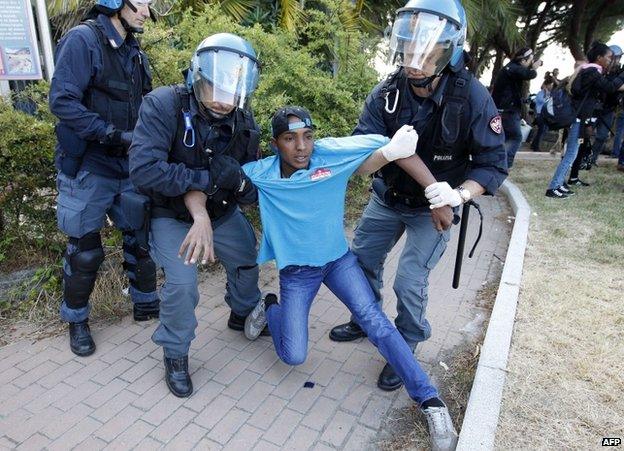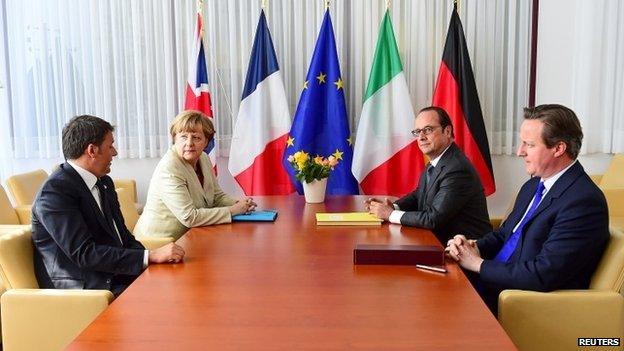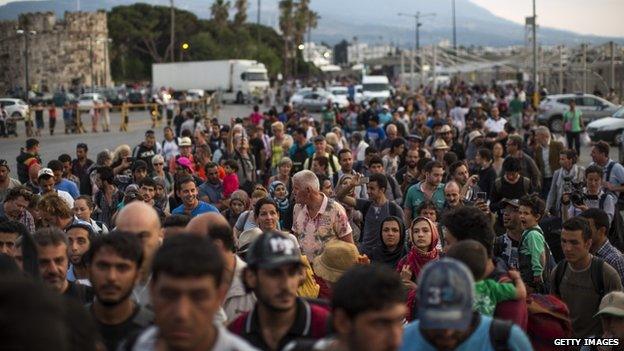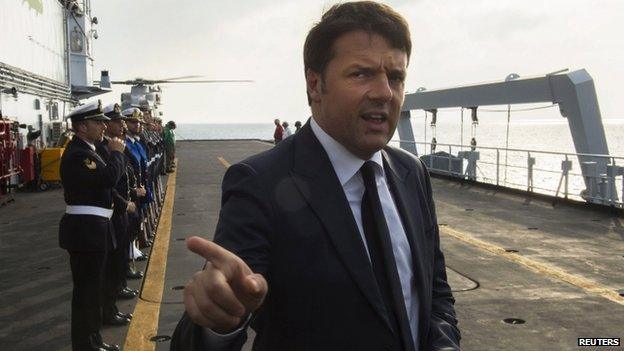EU solidarity damaged by splits on migrants and Greece
- Published
- comments

Italy and France are involved in a dispute over hundreds of migrants trying to cross the Italian border
"A community of values". Always standing by those seeking "peace and human dignity." "A vision of freedom and justice."
That was how Jose Manuel Barroso, then EU Commission President, described the European Union three years ago when it was awarded the Nobel Peace Prize.
But take a long, hard look at the bickering, posturing and dirty media war currently being fought over the Greek euro crisis and the migrant tragedy now bleeding in to the Mediterranean and the EU's image looks decidedly less shiny.
In EU circles, the word "solidarity" is being bandied about more than ever - but those using it are invariably arguing for something in their own national interest.
Greece calls on its creditors to show solidarity with its austerity-stricken population and to restructure (meaning reduce) its debts.

European leaders are divided on proposals for a quota system to take in migrants
In turn, big creditor nations like Germany are refusing debt haircuts - insisting that they must show solidarity with their own taxpayers whose money flows to Greece.
The migration crisis in the Mediterranean makes the biggest mockery of the EU claim to always stand by those in pursuit of peace and human dignity.
There is very little dignity evident in the cramped, unhygienic, panicked conditions on board the boats crammed full of desperate people, washing over to Europe from Libya. And even less dignity on display amongst the EU nations falling over themselves to explain why those people should not be their problem.
A community of values indeed.
'Flood of immigrants'
The migrant issue is, of course, a very emotional one.

More than 100,000 migrants have arrived in Europe in 2015, many in Italy and Greece
How can one not feel outrage about the people smugglers and compassion for the innocent when confronted with images of small babies, unaccompanied youngsters, pregnant women and war-scarred men stumbling on to Europe's shores?
More than 100,000 people have arrived in Europe like this so far this year.
Many EU governments and citizens undoubtedly are horrified at the human suffering, fewer are keen on welcoming migrants, caring for them socially and medically and paying for them to start new lives, particularly in the wake of a biting economic crisis, whose toothmarks are still evident all over the continent.
The prospect of the arrival of a "flood of immigrants" often provokes another emotional reaction in Europe which has precious little to do with solidarity.
Ministers from all 28 EU countries were meeting in Luxembourg on Tuesday to discuss proposals to tackle the crisis.
These include the recently bolstered search and rescue mission in the Mediterranean, the (limited) plan to work with African nations to better prevent economic migrants leaving for Europe, the speedier forced return of economic migrants who make it to Europe, and the sharing of asylum applications more equally across the EU.
The burden-sharing pilot project is daring in its premise but extremely modest in its scale.

European Commission migrant plan
How can EU address its migrant issue?
EU countries volunteer to take in a certain number of a total of 20,000 asylum seekers who have not yet left north Africa for Europe
EU countries accept a mandatory quota system (based on GDP, population, unemployment, and how many asylum seekers they have taken in the past) to redistribute 40,000 Syrian and Eritrean asylum seekers, who arrive in the EU by boat

The chances of this plan being accepted by EU ministers are about zero.
EU countries can roughly be divided into three categories in terms of their attitude towards the proposed quota system.
The most sanguine are the Danes, the British, and the Irish who have exemptions on issues like this and so are free to make decisions after listening to their voters, their economists and their consciences.
Then comes a group of important nations, including France, Germany, and Italy, which accept the idea of redistribution but remain uncertain over elements of the plan.
And finally, there are the countries mainly in Central and Eastern Europe who reject the idea outright and have threatened to scupper it.
'Make Europe suffer'
Before passing judgement, it is worth bearing in mind here that the minimum wage in the Baltics is lower than that in struggling Greece; that Hungary is already an overland EU transit hot-spot for would-be asylum seekers from Syria and Afghanistan as well as nearby Albania and Kosovo; and that Poland has taken in tens of thousands of Ukrainians fleeing the fighting with Russian-backed separatists.
Poland is thought to be a deciding nation when it comes to the quota proposal.
Its buy-in might be secured by an assurance from key EU nations, like Germany, that they will stand firm over an issue that Poland feels far more strongly about - maintaining strong sanctions against Russia.

The Italian prime minister has threatened to hurt Europe if he does not get help
So this is what solidarity really looks like, EU style: horse-trading to ensure a national advantage.
And while the ministers bicker and exchange recriminations behind closed doors in Luxembourg, there is an ugly display of EU community values in a far more public arena.
France has closed its borders to migrants coming from Italy; and neighbouring Switzerland, Austria and Slovenia are threatening to do the same.
Now the beleaguered Italian Prime Minister, Matteo Renzi, has made his own threat: to "make Europe suffer" if he does not get help.
Fast.